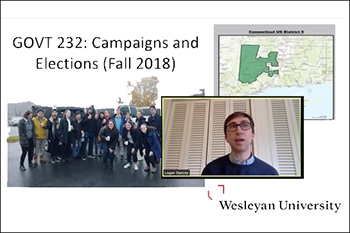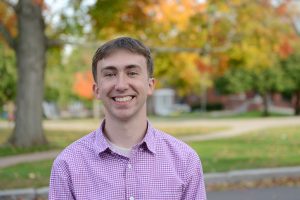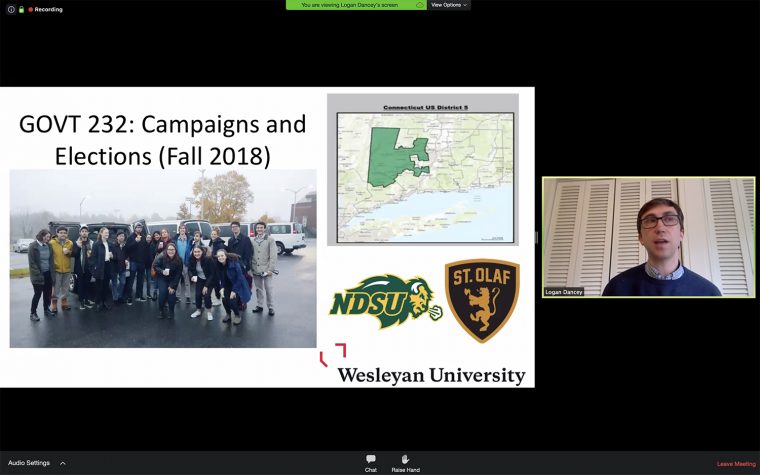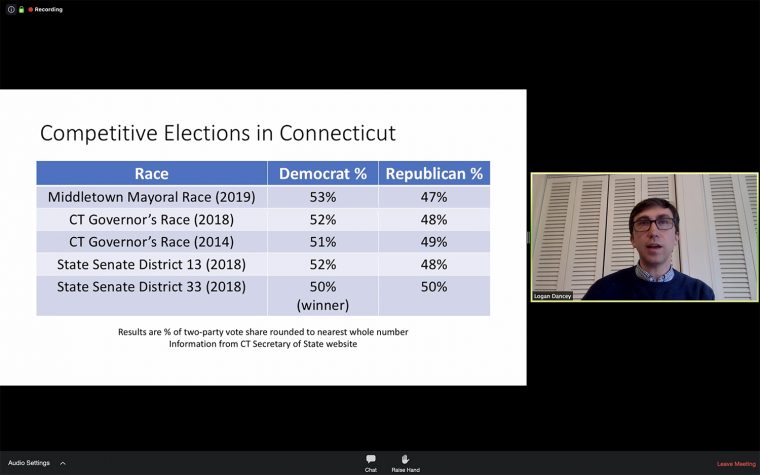Dancey Engages Students in Elections Research, E2020 Initiative


Associate Professor of Government Logan Dancey foresees many important opportunities for students to get involved and make a difference with upcoming local elections this fall—and the Engage 2020 (E2020 initiative) will be a prime vehicle for that work.
Dancey recently gave a presentation via Zoom video webinar to Wesleyan faculty and staff about his research on American electoral politics and his work with students on this topic. Featured as part of the regular staff luncheon series, Dancey’s talk was titled “Student-Centered Elections Research: From the Middletown Mayoral Race to E2020.”
“It won’t surprise many of you to know that we are in a very polarized time,” Dancey said. His work with students in his recent courses represents some of his recent efforts to gather and analyze data about the United States’ increasingly polarized electorate. It also informs future projects for Dancey and his students, particularly in the upcoming semester, as part of E2020, a comprehensive University effort to support student learning via civic engagement and liberal arts education.
With more than 200 participating universities, ranging from large research universities to small liberal arts colleges to religious schools, E2020 is open to and encourages participation regardless of political affiliations or stances on specific issues. At Wesleyan, students have already begun to engage in E2020-related work on behalf of voter registration efforts, issue advocacy initiatives, and local and national campaigns. Other opportunities to participate include attending events and talks by guest speakers, and taking courses with content relevant to elections, such as those taught by Dancey.
Dancey’s GOVT 232: Campaigns and Elections class has recently focused on developing, executing, and analyzing the results of exit polls they conducted on Election Day. In the fall of 2018, his class conducted exit polling in Connecticut, and partnered with students at two universities in Minnesota and North Dakota to share results. Their work yielded “a rich data set” from the results of 1,300 surveys in the three states. The data allowed students to analyze, compare, and contrast partisan perspectives on issues such as gender discrimination and gun control, Dancey said.

Last year, Dancey focused on the Middletown municipal elections, which saw a tight race between newcomer (and ultimate victor) Ben Florsheim ’14 and Seb Guiliano. Students Claire Isenegger ’21 and Caroline Salim ’21 developed a questionnaire and exit polling plan as part of a tutorial they took with Dancey, and Dancey’s Campaigns and Elections class partnered with Associate Professor of Government and Director of the Wesleyan Media Project Erika Franklin Fowler’s Empirical Methods for Political Science class to administer the survey. The students collected surveys from roughly 300 Middletown voters (although Dancey cautioned that the respondents who agree to take an exit poll are not a random sample of voters).
“We were interested in the extent to which attitudes toward [President] Trump were a predictor of vote choice in a local election,” Dancey said. “What we found was that among the voters we surveyed, approval of Trump was a better predictor of vote choice for mayor than was approval of the outgoing mayor [Dan Drew, a Democrat like Florsheim].” Notably, Dancey said, “voters seemed to be less polarized about issues at the local level.”
As the Wesleyan community turns its focus to the E2020 initiative and the upcoming elections later this year, these findings will inspire and inform Dancey’s upcoming work. He said both he and Franklin Fowler believe it is important to share information about “down-ballot” races, or races that are being listed “down the ballot” from, or below, the presidential election, such as congressional and state legislative races. He and Franklin Fowler will work with students next semester to try to collect information about these “down-ballot” races, and engage students in new ways to analyze and share this information with the broader public.

They will work through the Wesleyan Media Project to collect and analyze candidates’ priorities through their advertising. They are also hoping to continue conducting exit polling with students (even if that work may take a different form, due to the COVID-19 pandemic), an experience that Dancey believes helps strengthen students’ knowledge of and personal connection with local politics.
Paraphrasing the E2020 initiative’s manifesto, he said, “This is a unique moment and opportunity for civic participation in the 2020 election cycle. . . . There are lots of opportunities for students to get engaged and help provide information to voters interested in local elections.”

